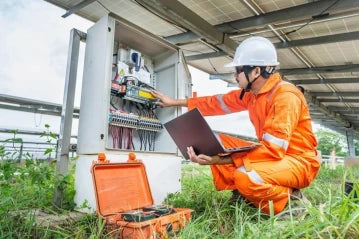
Investing in solar energy is a smart decision that promotes sustainability and reduces our carbon footprint. Solar inverters play a vital role in this energy conversion process, transforming the direct current (DC) produced by solar panels into usable alternating current (AC) electricity. However, encountering a beeping solar inverter can be frustrating and cause concern. In this blog post, we will explore the possible reasons behind this beeping and provide troubleshooting solutions to help you address the issue promptly.
Why is My Solar Inverter Beeping?
1. Low Voltage:
One common reason for a beeping solar inverter is low voltage. This occurs when the incoming voltage from the solar panels drops below a certain threshold, indicating a potential issue. Low voltage can be caused by shading, poor panel orientation, or a faulty connection. In such cases, the inverter emits a beeping sound as a warning sign.
2. Self-Test Failure:
Solar inverters are equipped with self-diagnostic capabilities to ensure optimal performance. If the inverter fails its self-test during startup or encounters a fault during operation, it may start beeping to notify you of the issue. Self-test failures can occur due to internal component faults, excessive heat, or communication errors.
3. Overload Condition:
Solar inverters are designed to handle a specific load capacity. If the connected electrical load exceeds the inverter's rated capacity, it can trigger an overload condition. In response, the inverter may emit a beeping sound to indicate that it is unable to handle the excessive load. This situation commonly occurs when additional appliances are connected without considering the inverter's capacity.
4. The Inverter Battery is Low:
Some solar inverters are integrated with batteries to store excess energy for later use. If the battery charge drops below a certain level, the inverter may beep as a warning. This could be caused by extended periods of high energy consumption, insufficient sunlight for recharging, or a faulty battery.
5. The Cable Size is Wrong:
Proper cable sizing is crucial for efficient and safe operation of your solar energy system. If the cables connecting the solar panels to the inverter are undersized or have high resistance, it can lead to voltage drops and increased heat. As a result, the inverter may produce a beeping sound to indicate the presence of an electrical issue.
6. Change From Line to Battery Power:
In certain cases, solar inverters can operate in both grid-connected and off-grid modes. When switching from grid-connected mode to battery power due to a power outage or maintenance, the inverter may emit a beeping sound to notify you of the transition. This beeping serves as a useful reminder that the system is now operating on stored energy.
How Do I Stop My Solar Inverter from Beeping Continuously?
Now that we have explored the possible reasons for a beeping solar inverter, let's discuss how you can troubleshoot and resolve the issue:
1. Check the display: Many solar inverters have a digital display that provides valuable information about the system's status. Review the display for error codes or fault messages, and consult the user manual or contact the manufacturer for specific guidance.
2. Inspect the solar panels: Ensure that the solar panels are free from shading or debris that might affect their performance. Additionally, verify that the panels are correctly oriented and angled to receive maximum sunlight.
3. Examine the cables: Check the cables for any signs of damage, loose connections, or incorrect sizing. Ensure that the cables are securely connected to both the solar panels and the inverter, and consider consulting a professional installer if necessary.
4. Reset the inverter: Some inverters allow for a simple reset by disconnecting the power supply and reconnecting it after a short period. Refer to the user manual or manufacturer's guidelines to perform a proper reset.
5. Consult a professional: If the beeping persists or you are unsure about performing troubleshooting steps yourself, it is recommended to contact a qualified solar energy professional. They have the expertise to diagnose and address complex issues effectively, ensuring the optimal performance of your solar energy system.
Why is My Solar Inverter Battery Refusing to Charge?
If your solar inverter battery is not charging properly, several factors may be at play:
1. Inadequate sunlight exposure: Solar panels require sufficient sunlight to generate electricity and charge the batteries. Shading, obstructions, or a suboptimal panel orientation can significantly reduce the amount of sunlight reaching the panels, affecting battery charging.
2. Faulty battery connections: Ensure that the battery connections are secure and free from corrosion. Loose or damaged connections can disrupt the charging process and cause the battery to refuse charging.
3. Aging battery: Over time, solar batteries may lose their capacity to hold a charge effectively. If your battery is old or damaged, it may need to be replaced to restore proper charging functionality.
4. Inverter settings: Review the settings on your solar inverter to ensure that they are configured correctly for battery charging. Improper settings can prevent the battery from charging as intended.
5. Faulty charge controller: The charge controller regulates the charging process and protects the battery from overcharging or excessive discharge. If the charge controller malfunctions, it can prevent the battery from charging properly. Consider consulting a professional to inspect and diagnose any issues with the charge controller.
Conclusion
Understanding the reasons behind a beeping solar inverter and knowing how to troubleshoot common issues is essential for maintaining the optimal performance of your solar energy system. By addressing these issues promptly, you can ensure efficient energy conversion, maximize the benefits of solar power, and contribute to a more sustainable future. If you encounter persistent problems or need professional assistance, always consult qualified solar energy professionals to ensure the proper functioning of your system.


0 comments